Does wintertime make you out of sorts, lack motivation, and feel unfocused? Try these refreshing, energizing, and uplifting aromas that help bring balance back and help you get back on track.
Living in Wisconsin, I struggle to stay motivated with less sunshine and outdoor activities. This time of year can be difficult as we become less active and spend more time inside. Essential oils are one of the ways to help get me out of my funk and help me get motivated.
I love using essential oils because not only are they natural, but they have a broad range of uses. According to the Cleaveland Clinic, essential oils can help improve your mood. Depending on the oil, it may help boost mood, improve job performance, help with sleep, relieve headaches, and much more. It’s important to realize that essential oils are a “tool in your wellness toolbox,” not medicine. So while essential oils can be a great complement to your daily regimen, it is important to recognize their place.
What Are Essential Oils?
Essential oils are the essence of the plant. The oil is made by isolating the liquid that comes from the plant material. The most common way they are extracted is through distillation, expression, and supercritical co2 extraction. It is important to point out that a lot of plant material is used to make essential oils. When using them, a little goes a long way.
As essential oil users, we should be mindful of the earth and sustainability. When sourcing your oils, always make sure to get them from a reputable supplier.
How Do Essential Oils Boost Your Mood?
According to Rachel Herz, a cognitive neuroscientist, your sense of smell has a connection to emotions, learning, and memory. If an odor connects to an emotional experience- good or bad- there is an association with your memory that forms when that smell is experienced.
This emotional response to essential oils can affect your body and mind. A positive experience with an oil can affect your emotions, benefiting your mental and physical health and increasing your well-being.
The emotional connection to an oil is really important. I always tell clients that scent is personal and it’s okay not to like an oil. Often the feeling about an oil or aroma is tied to an experience that we have had that shapes our thoughts and feelings about the oil. These experiences are the very reason I love eucalyptus oil. It reminds me of my honeymoon. Anytime I smell it, I am brought back to those cherished memories.
Using essential oils that are uplifting, bright, and invigorating can not only help support focus and energy, but it can also create a positive experience.
There are so many beautiful oils to choose from, so if you don’t like an oil, chances are you can find another one that you do enjoy. To maximize your experience, try connecting with an oil you do like so you can experience a positive emotion.
Here are my top 7 favorite oils to create a positive, energizing environment that can help me get focused and motivated.
Best Oils For Focus and Energy
Eucalyptus: Eucalyptus globulus
Aroma profile: Fresh, woody, and camphorus. High-intensity aroma.
Benefits:
- This bright pop of scent will help keep you alert and boost your senses. Stimulate and clear your mind.
- Promote motivation, productivity, and energy with this refreshing scent.
- This lively oil with inspire positivity to combat negative thinking and drowsiness.
Adulteration of this oil is unlikely, so it is a good choice for obtaining pure oil.
Oil Origin: Steam distilled from fresh leaves.
Best way to use it: Aromatherapy stick inhaler, room spray roll-on, or diffusing for short periods of time.
Cautions: Use with small children is not appropriate.
My favorite ways to use it: Eucalyptus essential oil is an excellent choice on a long winter day when it is stuffy inside, and I need a fresh pop of aroma. This oil is considered a deodorant; I use it to clear the air. I have two teenage boys, so using it in the bathroom keeps the room smelling fresh.
Rosemary: Rosmarinus officinalis
Aroma Profile: Strong herbaceous, fresh, slight wood aroma
Benefits:
- The scent of this oil is invigorating and stimulating.
- This garden scent can promote emotional renewal, concentration, and mental stability in times of mental fatigue.
Oil Origin: Steam distilled from fresh or recently dried plants.
Best way to use it: Aromatherapy stick inhaler, room spray roll-on, or diffusing for short periods of time.
Facts: Studies on rosemary essential oil have revealed that nurses and graduate nursing students showed increased alertness when rosemary was inhaled. This oil has also been found to improve focus, clarity, and mental function.
Cautions: Due to the high camphor content, this oil should not be used if you are epileptic. Do not use with children under 5yrs. Of age.
My favorite ways to use it: Rosemary essential oil is my go-to when I need to focus or concentrate, whether writing a blog, studying, or getting ready to pitch an idea. Rosemary is the oil I love to use in these situations. It is very stimulating and uplifting, so in my afternoon slump, it can bring a bright mood to my space.
Blend recommendations: I love mixing together rosemary and bergamot for a fresh, clarifying scent.
Spearmint: Mentha spicata
Aroma Profile: A cooling oil. Sweet, minty fresh, clean, invigorating
Benefits:
- The scent of this oil is a pop of minty freshness that will invigorate your exhausted mind.
- This fresh aroma will elevate your mind, bring balance to moodiness, promote positive energy, and leave you feeling refreshed.
Facts: A study in JACM suggests that spearmint could improve the quality of working and spatial memory.
Oil Origin: Steam distilled from leaves and flowering tops.
Best way to use it: Aromatherapy stick inhaler, room spray roll-on, or diffusing for short periods of time.
My favorite ways to use it: Spearmint essential oil reminds me of my childhood. I was an avid gum chewer, so anytime I smell spearmint, I am brought back to my younger days. The fresh, minty aroma helps to clear my negative or moody mind. If I am having a bad day, feeling stressed out, and need to shift to more positive energy, this is what I use to ease my stress.
Blend recommendations: Mix together spearmint and orange for a mood boost.
Don’t want to blend yourself?
Check out our expertly crafted blends. Each essential oil blend is created by Beth, a scientist of 25yrs. and a certified aromatherapist. She uses the science and chemistry of the oils to formulate a functional blend.
Melissa essential oil: Melissa officinalis
Aroma profile: Citrus, sweet, slightly herbaceous.
Benefits:
- Emotionally stabilizing.
- Promotes optimism and balances negative feelings of frustration.
- Calms an overactive mind.
- Provides emotional support when experiencing poor focus, concentration, distraction, and memory.
Oil Origin: Steam distilled from leaves and flower buds.
Adulteration of this oil is highly likely, so make sure you get it from a reputable supplier.
Best way to use it: Aromatherapy stick inhaler, room spray, roll-on, or diffusing for short periods of time.
Cautions: This oil can have drug interactions. Check with a physician before using. Melissa can also cause skin sensitivities, so it is important to use it topically at the recommended concentration.
My favorite ways to use it: If I were on a deserted island and could only bring one oil, this would be it. Uplifting, lemony, and bright. This oil helps to calm my mind when I am frustrated, irritated, or agitated. If I have had a busy day and find my mind on overdrive, this oil brings me back into balance.
Petitgrain Bigrade essential oil: Citrus aurantium
Aroma profile: Sweet but tart floral, reminiscent of orange flowers.
Benefits:
- Mildly calming to help manage anxiety and stressful moments, emotionally stabilizing to support burnout.
- Restores the spirit to aid chronic fatigue, nervous tension, and distraction.
- Oil Origin: Steam distilled from leaves and twigs.
Adulteration of this oil is highly likely, so make sure you get it from a reputable supplier.
Best way to use it: Aromatherapy stick inhaler, room spray, roll-on, or diffusing for short periods of time.
My favorite ways to use it: The tart, citrusy scent of petitgrain helps me when I feel fatigued and have a lot of nervous energy. I usually use this oil in combination with other oils, as the aroma is too bitter for me to use alone. Combine it with roman chamomile for a relaxing combination.
Fun fact: This oil is known as the Poor Man’s Neroli because it is less expensive than neroli but has many of the same benefits.
Scotch Pine essential oil: Pinus sylvestris
Aroma profile: Strong coniferous, crisp, and balsamic.
Benefits:
- Very stimulating. Emotionally and spiritually balancing to support you during moments of mental and emotional burnout.
- Bring a connection with nature.
- Uplifting aroma to clear space of negative energy to help promote motivation during times of discouragement and self-neglect.
- Energizing and uplifting aroma to help combat fatigue and promote focus.
Oil Origin: Steam distilled from pine needles.
Best way to use it: Aromatherapy stick inhaler, room spray, roll-on, or diffusing for short periods of time.
My favorite ways to use it: Scotch pine essential oil is very stimulating and energetically balancing. I love to be outdoors; it is my favorite way to de-stress and unwind, so in the winter; when I can’t get outside, this oil helps connect me to the outdoors. If I am making a particularly aromatic dish in the kitchen, this helps to deodorize the room and leave it smelling fresh.
Blend recommendations: Mix together scotch pine and lemon to brighten your space.
Don’t want to blend yourself?
Check out our expertly crafted blends. Each essential oil blend is created by Beth, a scientist of 25yrs. and a certified aromatherapist. She uses the science and chemistry of the oils to formulate a functional blend.
Bergamot essential oil: Citrus aurantium var. bergamia
Aroma profile: Reminiscent of Earl Gray tea, slightly spicy, fresh, gentle citrus.
Benefits:
- Emotionally balancing your mood and uplifting to help when you are feeling sluggish or need an energy boost.
- This happy bouquet will brighten your mood and refresh your mind when you are feeling fatigued or experiencing nervous exhaustion.
Oil Origin: Expression of the fruit peel.
Best way to use it: Aromatherapy stick inhaler, room spray, roll-on, or diffusing for short periods of time.
My favorite ways to use it: I absolutely love bergamot. I am a huge fan of Early Gray tea, and the fragrance of bergamot always leaves me wanting a cup of tea. Its fresh, uplifting aroma helps me kick-start my mornings. If you know me, I am not a morning person. The citrus scent creates a happy space that helps to brighten my mood.
Cautions: Do not apply to skin, as this oil is phototoxic when applied to the skin unless using the Bergamot Free (BF) oil. See my blog about photosensitivity and phototoxic oils to learn more: Photosensitivity and Essential Oils: Important Facts to Keep You Safe | B. Divine Aromatherapy (www.bdivinearoma.com)
Here is a chart for quick reference of the different oils and how they can help your wellbeing:
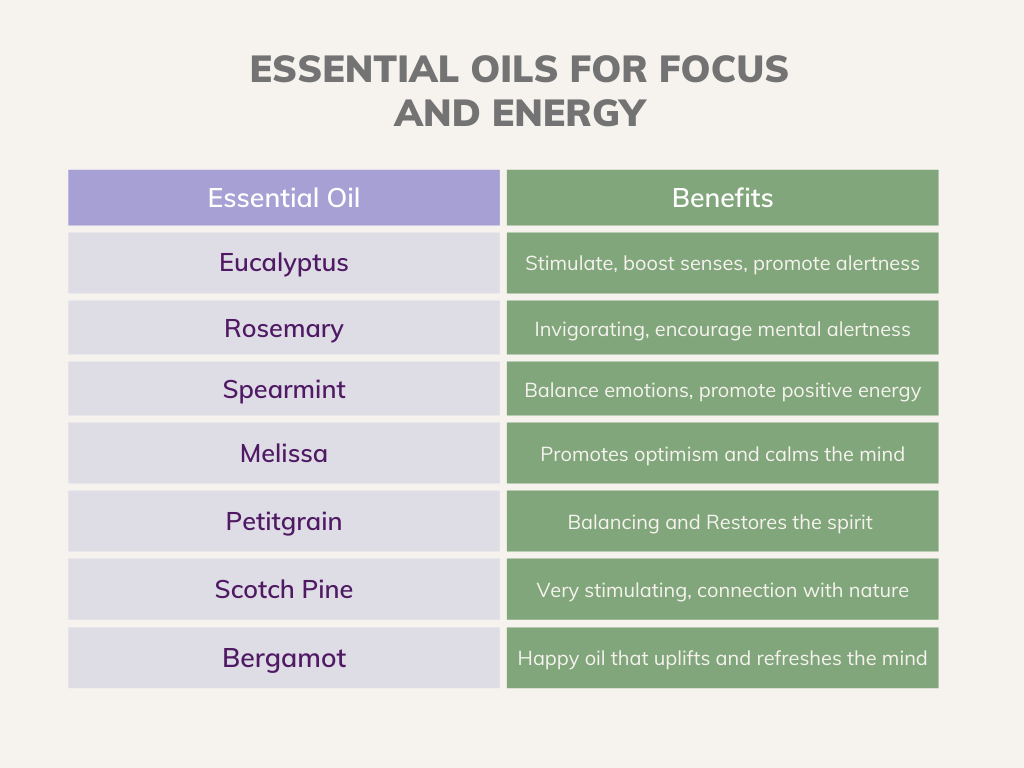
Important Safety Note: It is important to seek the advice of a physician if you are currently taking medications or have a medical condition. Some essential oils can interact with medication. If you are pregnant or nursing, consult your doctor before using essential oils.
Not all essential oils are suitable for children. It is important to understand the safety information of each oil before use.
Essential oils are not medicine and should not be used as such. Always consider and consult the safety advice given for each essential oil.
References
Buckle, J. (2003). Clinical Aromatherapy: Essential Oils in Practice.
CHEN, M.-L., CHEN, Y.-E., & LEE, H.-F. (2021). The Effect of Bergamot Essential Oil Aromatherapy on Improving Depressive Mood and Sleep Quality in Postpartum Women. Journal of Nursing Research, Publish Ahead of Print. https://doi.org/10.1097/jnr.0000000000000459
Herz, R. S. (2016). The Role of Odor-Evoked Memory in Psychological and Physiological Health. Brain Sciences, 6(3), 22. https://doi.org/10.3390/brainsci6030022
Expert on Psychological Science of Smell | Rachel Herz
Holmes, P. (2016). Aromatica Volume 1: A Clinical Guide to Essential Oil Therapeutics. Principles and Profiles. Singing Dragon.
Holmes, P. (2019). Aromatica Volume 2: A Clinical Guide to Essential Oil Therapeutics. Applications and Profiles. Singing Dragon.
Kennedy, D., Okello, E., Chazot, P., Howes, M.-J., Ohiomokhare, S., Jackson, P., Haskell-Ramsay, C., Khan, J., Forster, J., & Wightman, E. (2018). Volatile Terpenes and Brain Function: Investigation of the Cognitive and Mood Effects of Mentha × Piperita L. Essential Oil with In Vitro Properties Relevant to Central Nervous System Function. Nutrients, 10(8), 1029. https://doi.org/10.3390/nu10081029
Lis-Balchin, M. (n.d.). Aromatherapy science. Pharmaceutical Press.
McCaffrey, R., Thomas, D. J., & Kinzelman, A. O. (2009). The Effects of Lavender and Rosemary Essential Oils on Test-Taking Anxiety Among Graduate Nursing Students. Holistic Nursing Practice, 23(2), 88–93. https://doi.org/10.1097/hnp.0b013e3181a110aa
Moss, L., Rouse, M., Wesnes, K., & Moss, M. B. (2010). Differential effects of the aromas of Salvia species on memory and mood. Human Psychopharmacology-Clinical and Experimental. https://doi.org/10.1002/hup.1129
Nasiri, A., & Boroomand, M. M. (2021). The effect of rosemary essential oil inhalation on sleepiness and alertness of shift-working nurses: A randomized, controlled field trial. Complementary Therapies in Clinical Practice, 43, 101326. https://doi.org/10.1016/j.ctcp.2021.101326
Petersen, D. (2013). Aromatherapy Materia Medica. American College of Healthcare Sciences.
Tisser, R. (2014). Essential Oil Safety (Second Edition). Churchill Livingstone.
Watson, K., Hatcher, D., & Good, A. (2019). A randomised controlled trial of Lavender (Lavandula Angustifolia) and Lemon Balm (Melissa Officinalis) essential oils for the treatment of agitated behaviour in older people with and without dementia. Complementary Therapies in Medicine, 42, 366–373. https://doi.org/10.1016/j.ctim.2018.12.016
Watanabe, E., Kuchta, K., Kimura, M., Rauwald, H. W., Kamei, T., & Imanishi, J. (2015). Effects of Bergamot (Citrus bergamia (Risso) Wright & Arn.) Essential Oil Aromatherapy on Mood States, Parasympathetic Nervous System Activity, and Salivary Cortisol Levels in 41 Healthy Females. Complementary Medicine Research, 22(1), 43–49. https://doi.org/10.1159/000380989
Veiskaramian, A., Gholami, M., Yarahmadi, S., Amanolahi Baharvand, P., & Birjandi, M. (2021). Effect of aromatherapy with Melissa essential oil on stress and hemodynamic parameters in acute coronary syndrome patients: A clinical trial in the emergency department. Complementary Therapies in Clinical Practice, 44, 101436. https://doi.org/10.1016/j.ctcp.2021.101436

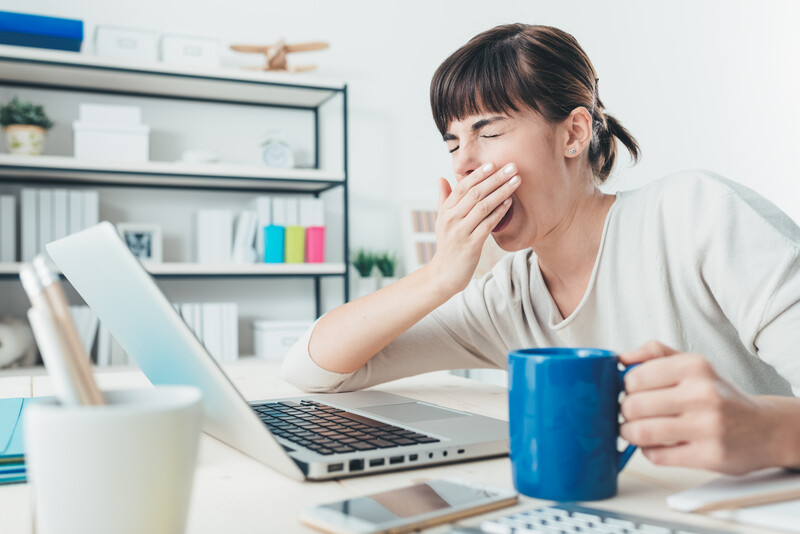
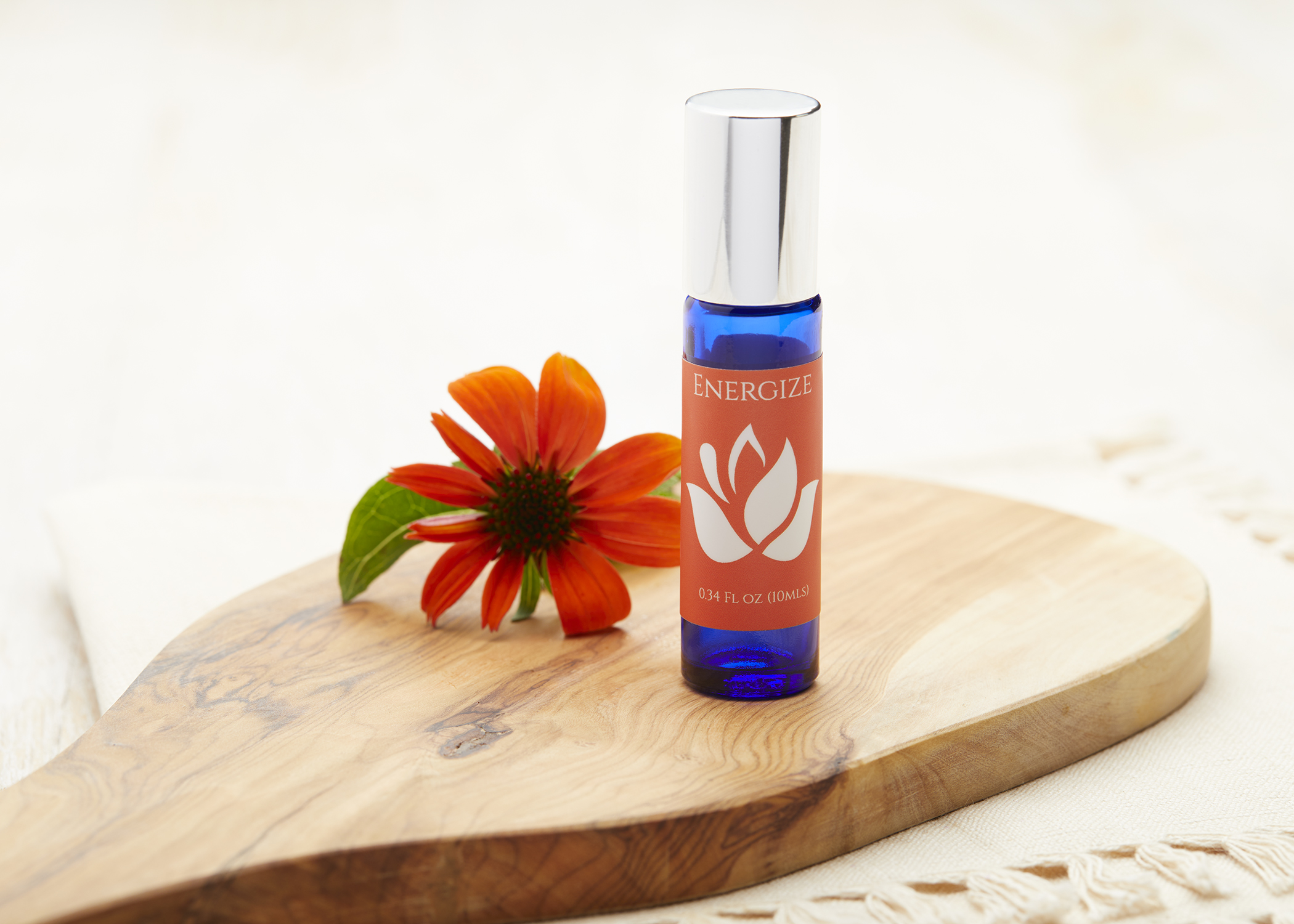
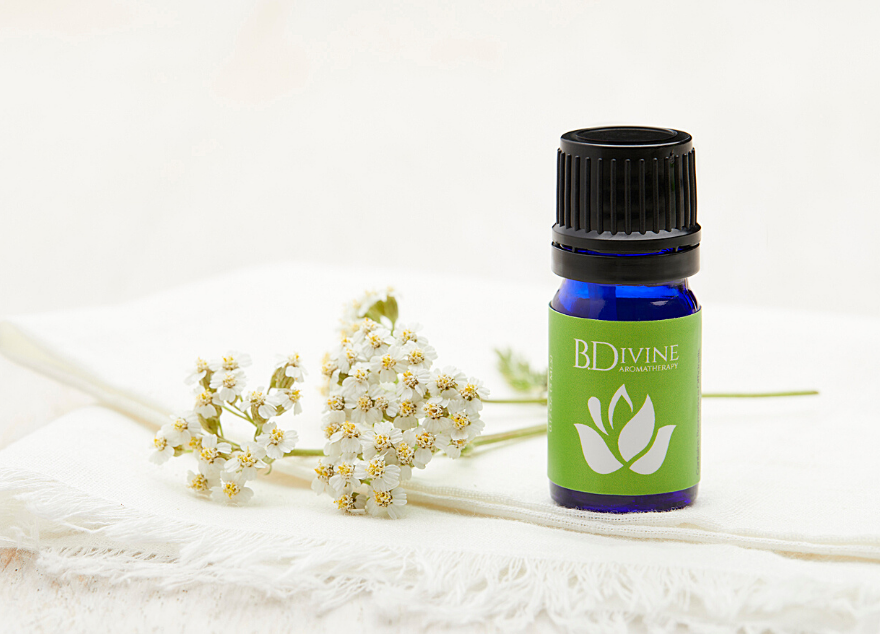
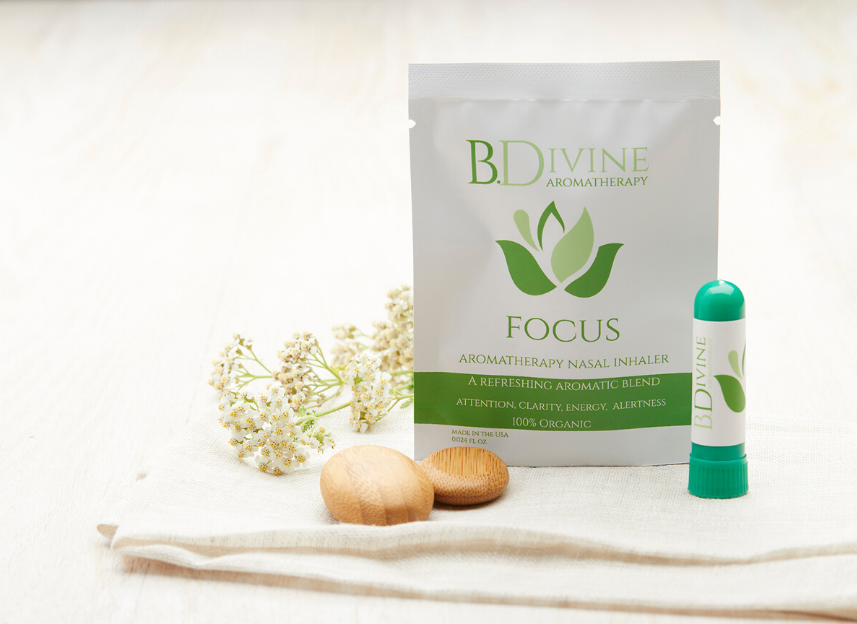
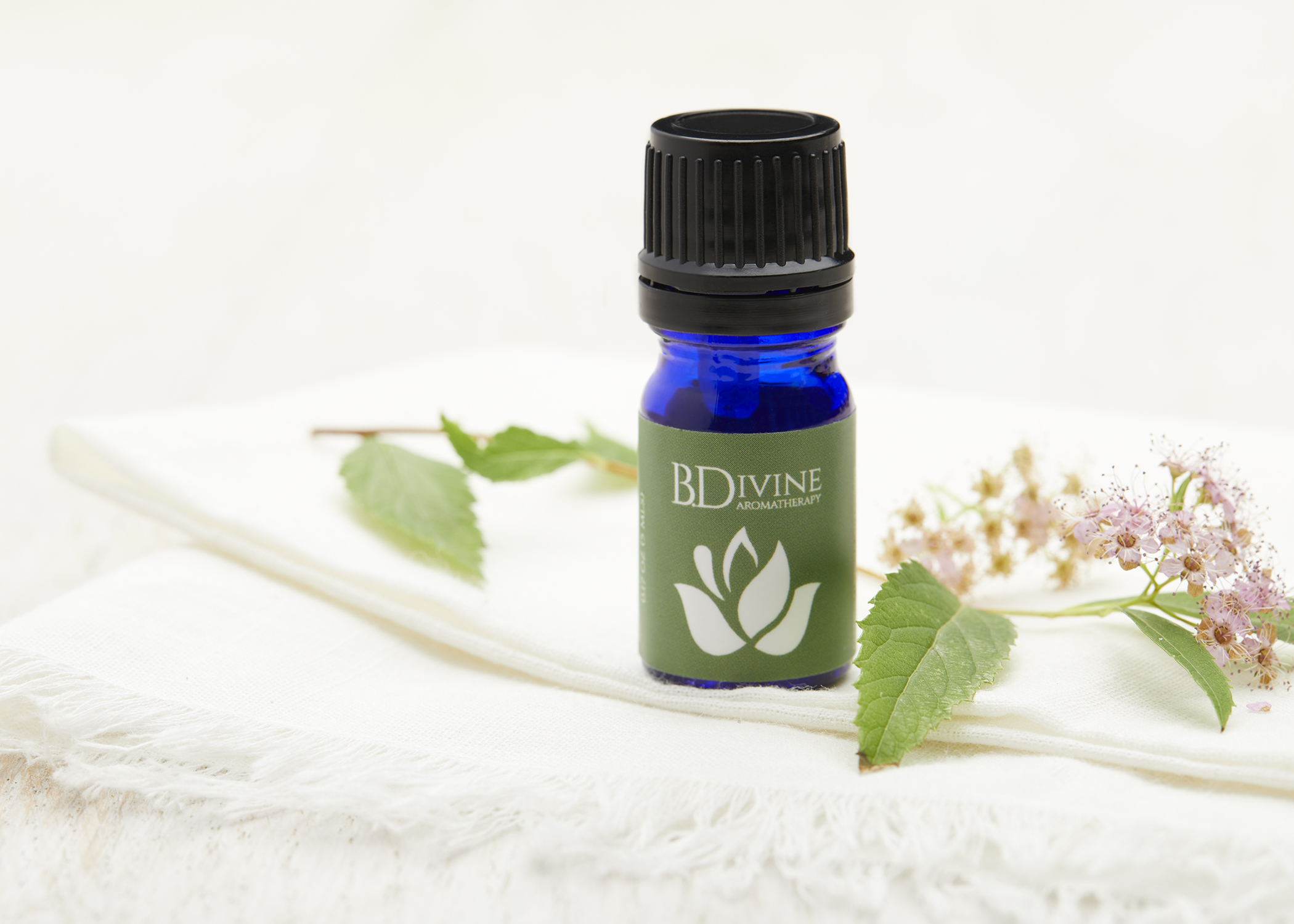
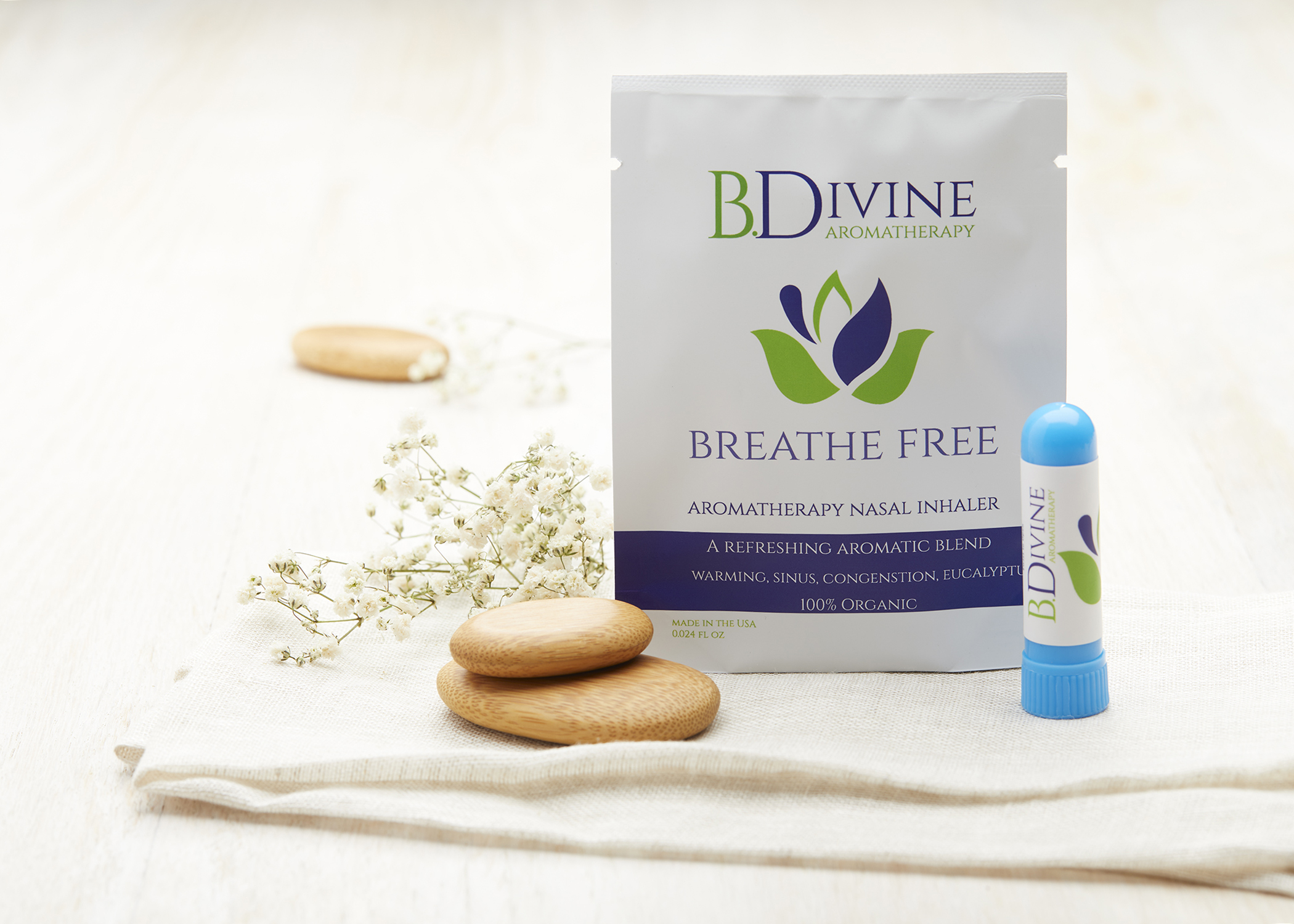

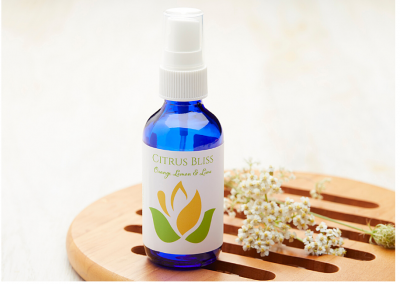
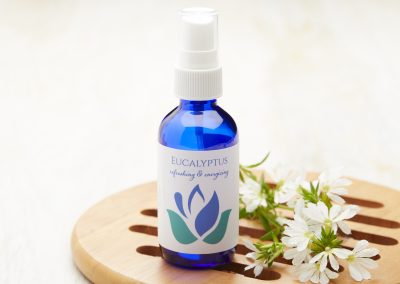
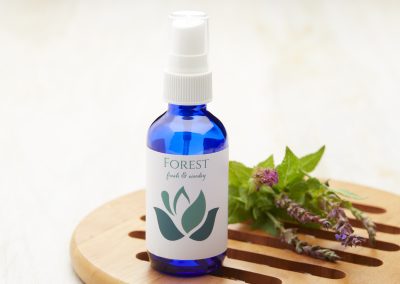
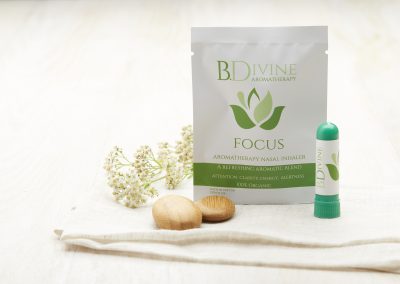
This article provides a comprehensive overview of essential oils for energy and focus. The tips on choosing the right oil based on individual preferences are commendable. Thank you for this informative article.
Thank you for sharing your thoughts. I hope you found it helpful.